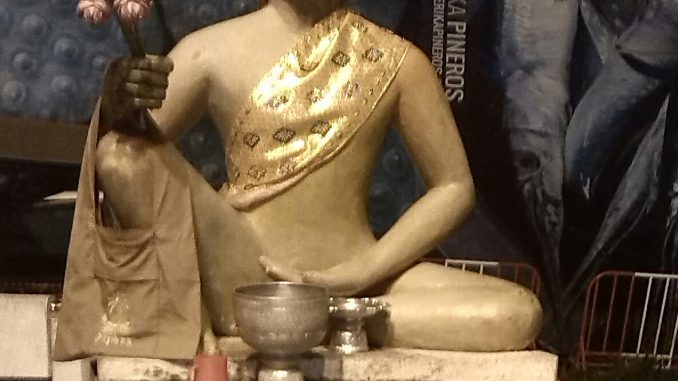
This is the statue of “Nak Ta Ma Chas Day”, the protector spirit of the city of Phnom Penh (Cambodia). He is supposed to be the lord of the city’s lands, though nobody ever offers him an incense or a prayer. Maybe this is why, it seems, recently he is not doing a very good job. Outsized buildings are erected suddenly and without any order; the Sokha family – one of the most powerful of the country – builds anywhere they want; and the police, occasionally, still kills protesters. Not to mention the memory of the genocide: only more than 30 years later, local and international institutions are beginning to recognize the invaluable contribution of traditional healers, in converting the millions of ghosts, scattered throughout the country, in “ancestors” of the community, and protectors of their lands.
- Two VERY INTERESTING articles on the management of memory: Maurice EISENBRUCH (2006), “The uses and abuses of culture: Cultural competence in post-mass crime peacebuilding in Cambodia” [PDF] :: Anne Yvonne GUILLOU (2012), “An alternative memory of the Khmer rouge genocide: the dead of the mass graves and the land guardian spirits” [PDF] :: see also M. Eisenbruch webpage
- Some text about the city: Sylvia NAM (2011) “Phnom Penh: From the Politics of Ruin to the Possibilities of Return” [link] :: Thomas KOLNBERGER (2012) “Between Mobility and Immobility: Traffic and Public Space in Phnom Penh” (nice photos) [link] :: AbdouMaliq SIMONE (2008) “The Politics of the Possible: Making Urban Life in Phnom Penh”, [link]
- A “classical” video: Ella PUGLIESE’s “We Want (u) To Know” (2011) [more up-to-date in facebook] – the result of a participative visual anthropology workshop, through the dark memory of post-traumatic Cambodia; received the Community Cinema Award in october 2013 at the Yamagata international festival, in Japan!
- Khan Saret, Tanja Schunert, “Exploring the Utilization of Buddhist Practices in Counseling for Two Different Groups of Service Providers (Monks and Psychologists) in Cambodia” [PDF]: with the collaboration of our friend Judith STRASSER, psychologist, organizer of the Conference “Mental Health of Khmer Rouge Survivors and Their Descendants” (2010)
- Fabienne LUGO (2002) Between a Tiger and a Crocodile: Management of Local Conflicts in Cambodia, an anthropological approach to traditional and new practices, UNESCO [PDF]